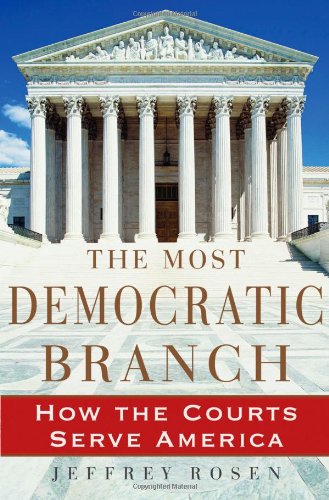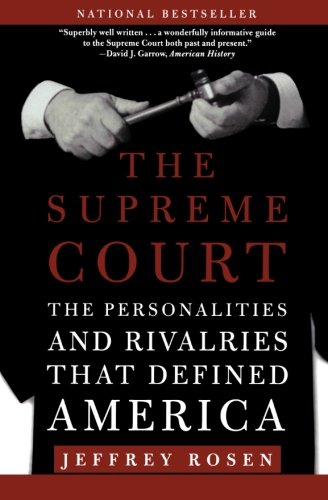Background
Rosen, Jeffrey Matthew was born on February 13, 1964 in New York City. Son of Sidney and Estelle Rosen.



(Many critics attack federal judges as anti-democratic eli...)
Many critics attack federal judges as anti-democratic elitists, activists out of step with the mainstream of American thought. But others argue that judges should stand alone as the ultimate guardians of American values, placing principle before the views of the people. In The Most Democratic Branch, Jeffrey Rosen disagrees with both assertions. Contrary to what interest groups may claim, he contends that, from the days of John Marshall right up to the present, the federal courts by and large have reflected the opinions of the mainstream. More important, he argues that the Supreme Court is most successful when it defers to the constitutional views of the American people, as represented most notably by Congress and the Presidency. And on the rare occasion when they departed from the consensus, the result has often been a disaster. To illustrate, Rosen provides a penetrating look at some of the most important Supreme Court cases in American history--cases involving racial equality, affirmative action, abortion, gay rights and gay marriage, the right to die, electoral disputes, and civil liberties in wartime. Rosen shows that the most notorious constitutional decisions in American history--the ones that have been most strenuously criticized, such as Dred Scott or Roe v. Wade--have gone against mainstream opinion. By contrast, the most successful decisions--from Marbury v. Madison to Brown v. Board of Education--have avoided imposing constitutional principles over the wishes of the people. Rosen concludes that the judiciary works best when it identifies the constitutional principles accepted by a majority of Americans, and enforces them unequivocally as fundamental law. Jeffrey Rosen is one of the most respected legal experts writing today, a regular contributor to The New York Times Magazine and the Legal Affairs Editor of The New Republic. The provocative arguments that he puts forth here are bound to fuel heated debate at a time when the federal judiciary is already the focus of fierce criticism.
http://www.amazon.com/gp/product/0195174437/?tag=2022091-20

( "Superbly well written . . . a wonderfully informative ...)
"Superbly well written . . . a wonderfully informative guide to the Supreme Court both past and present."--David J. Garrow, American History Jeffrey Rosen recounts the history of the Supreme Court through the personal and philosophical rivalries that have transformed the law--and by extension, our lives. With studies of four crucial conflicts--Chief Justice John Marshall and President Thomas Jefferson; post-Civil War justices John Marshall Harlan and Oliver Wendell Holmes; liberal icons Hugo Black and William O. Douglas; and conservative stalwarts William H. Rehnquist and Antonin Scalia--Rosen brings vividly to life the perennial rivalry between those justices guided by strong ideology and those who cared more about the court as an institution, forging coalitions and adjusting to new realities. He ends with a revealing conversation with Chief Justice John Roberts, who is attempting to change the court in unexpected ways. The stakes, he shows, are nothing less than the future of American jurisprudence.
http://www.amazon.com/gp/product/0805086854/?tag=2022091-20
chief justice commentator historian judge professor
Rosen, Jeffrey Matthew was born on February 13, 1964 in New York City. Son of Sidney and Estelle Rosen.
He graduated as valedictorian from the Dalton School (1982), summa cum laude from Harvard University in English Literature and Government (1986) and was a Marshall scholar at Balliol College, Oxford in Philosophy, Politics and Economics (1988), from which he received a second bachelor"s degree.
Legal historian David Garrow has called him "the nation"s most widely read and influential legal commentator". Since 2013, he has served as the President and Chief Executive Officer of the National Constitution Center in Philadelphia. He has been married to Christine Rosen (formerly Stolba), a historian, since 2003.
He also has a law degree from Yale Law School (1991), after which he served as law clerk to Chief Judge Abner Mikva.
He is a professor of law at the Law School of George Washington University in Washington, District of Columbia, and has been the commentator on legal affairs for The New Republic since 1992. Rosen is a nonresident senior fellow at the Brookings Institution, where he speaks and writes about technology and the future of democracy.
He often appears as a guest on National Public Radio, and is a frequent contributor to the New York Times Magazine. Rosen has written frequently about the United States Supreme Court.
He has interviewed Chief Justice John Roberts, Justice John Paul Stevens, and Justice Stephen Breyer.
Justice Ruth Bader Ginsburg credited his early support for her Supreme Court candidacy as a factor in her nomination. His essay about Sonia Sotomayor, then a potential Supreme Court nominee, provoked controversy for its use of anonymous sources. However, other media outlets, including the New York Times, had relied upon similar sources.
Rosen worked with Justice Elena Kagan for many years and is the brother-in-law of Justice Department attorney Neal Katyal.
In an opinion piece published after Kagan"s nomination hearings and before the Senate"s vote on her confirmation, Rosen encouraged Kagan to look to the late Justice Louis Brandeis as a model "to develop a positive vision of progressive jurisprudence in an age of economic crisis, financial power and technological change". Rosen"s articles assessing the Supreme Court have been ideologically unpredictable.
He strongly denounced Bush v. Gore, but supported the nomination of Chief Justice Roberts, while opposing that of Justice Alito.
He supported Sotomayor"s confirmation, and has written opinion pieces for the New York Times Magazine about the Court"s pro-business, anti-regulatory agenda.
Rosen also writes about the effects of technology on privacy and liberty, including articles about the Fourth Amendment implications of pre-flight screening by the TSA, free speech on the Internet, privacy in the Internet Age, surveillance cameras in Britain, data mining in Silicon Valley, technology and the Constitution, the effect of neuroscience on the law, deoxyribonucleic acid databases and genetic surveillance, and Google and the future of free speech.
(Many critics attack federal judges as anti-democratic eli...)
( "Superbly well written . . . a wonderfully informative ...)
Member Harvard Club, Cosmos Club, Phi Beta Kappa.
